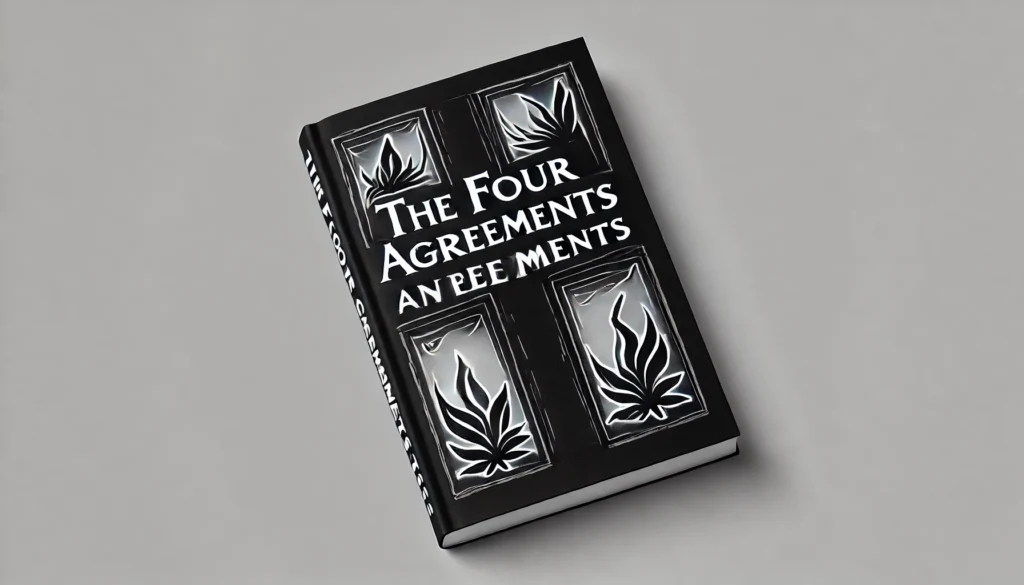Summary of The Four Agreements: A Practical Guide to Personal Freedom by Don Miguel Ruiz

What’s in it for me?
Embrace four transformative agreements that can lead to personal freedom and a life of true happiness.
The Four Agreements by Don Miguel Ruiz is a spiritual guide rooted in ancient Toltec wisdom, offering a powerful code of conduct that can lead to personal freedom and a life filled with love, happiness, and peace. Ruiz outlines four agreements that, when practiced consistently, can help you break free from limiting beliefs and societal conditioning, allowing you to live authentically and in harmony with others.
This summary will delve into the key ideas presented in the book, exploring each agreement and how it contributes to personal freedom and self-mastery.
Key Idea 1: Be Impeccable with Your Word
The first agreement, Be Impeccable with Your Word, emphasizes the power of language. Words have the ability to create or destroy, to heal or harm. Being impeccable with your word means using language with integrity, saying only what you mean, and speaking truthfully and kindly. Ruiz explains that your word is your power to create; it shapes your reality and influences the lives of those around you.
When you are impeccable with your word, you avoid self-criticism and judgment. This agreement encourages you to speak with clarity and positivity, to avoid gossip and negative self-talk, and to use your word to build yourself and others up. The ripple effect of this practice is profound, as it leads to a more peaceful and harmonious life, free from unnecessary conflict and misunderstanding.
By committing to this agreement, you align your words with your intentions, which in turn creates a life that is more authentic and in tune with your true self. This is the foundation for all the other agreements and is essential for achieving personal freedom.
Key Idea 2: Don’t Take Anything Personally
The second agreement, Don’t Take Anything Personally, teaches that nothing others do is because of you—it’s a reflection of their own reality. When you take things personally, you become vulnerable to the opinions and actions of others, allowing them to control your emotions and actions. Ruiz explains that taking things personally is a form of self-importance, as it assumes that everything is about you.
This agreement helps you develop emotional resilience and self-awareness. By understanding that people’s words and actions are a projection of their own beliefs and experiences, you can free yourself from the negative influence of others. This doesn’t mean you ignore feedback or constructive criticism, but rather that you learn to filter what is truly useful and discard what is not.
Practicing this agreement leads to greater inner peace and reduces the stress and anxiety that come from misinterpreting others’ behavior. It allows you to maintain your sense of self regardless of external circumstances, contributing to a more balanced and fulfilling life.
Key Idea 3: Don’t Make Assumptions
The third agreement, Don’t Make Assumptions, highlights the danger of making assumptions in our interactions with others. Assumptions often lead to misunderstandings, conflicts, and unnecessary drama because they are based on our own fears and insecurities rather than on reality. Ruiz encourages clear communication as the antidote to assumptions.
By asking questions and seeking clarification, you can prevent the miscommunication that assumptions often cause. This agreement promotes transparency and honesty in relationships, ensuring that everyone’s needs and expectations are understood. It also fosters a deeper connection with others, as it encourages open dialogue and mutual understanding.
Avoiding assumptions also means not assuming things about yourself—challenging your limiting beliefs and exploring new possibilities. This practice helps you live more fully in the present, free from the distortions of preconceived notions and unfounded expectations.
Key Idea 4: Always Do Your Best
The fourth agreement, Always Do Your Best, is about taking consistent action in alignment with your values and the other agreements. Ruiz emphasizes that your best will vary from moment to moment, depending on circumstances, energy levels, and other factors, but the key is to give your all in whatever you do.
This agreement is not about perfectionism; it’s about effort and commitment. When you always do your best, you avoid self-judgment, regret, and guilt because you know you’ve given your full effort. This approach to life fosters self-compassion and resilience, as you learn to accept your limitations while striving for growth.
By practicing this agreement, you integrate the previous three agreements into your daily life, making them a natural part of your behavior. It leads to a life of purpose and fulfillment, where you are fully engaged in your actions and responsibilities.
Key Idea 5: The Path to Personal Freedom
The four agreements collectively serve as a guide to achieving personal freedom—a state of being where you are no longer bound by fear, self-limiting beliefs, or societal conditioning. Ruiz describes this as a journey toward self-mastery, where you gradually replace old, harmful agreements with new, empowering ones.
The path to personal freedom involves breaking the cycle of domestication, where society imposes its rules and expectations on individuals from birth. By consciously adopting the four agreements, you reclaim your power and create a new dream—a life of authenticity, love, and happiness. This transformation requires discipline, awareness, and the courage to challenge deeply ingrained habits and beliefs.
In conclusion, The Four Agreements offers a practical and powerful framework for personal growth and spiritual enlightenment. By being impeccable with your word, not taking anything personally, avoiding assumptions, and always doing your best, you can achieve a life of freedom, peace, and joy.
Closing Note
If this summary resonated with you, your feedback would be greatly appreciated. Your thoughts help us continue to improve and provide the content you love. See you in the next summary!